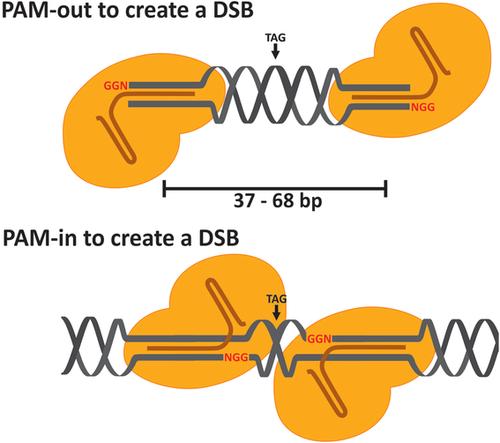下载PDF
{"title":"通过CRISPR/ cas9n介导的同源定向修复设计和衍生多报告多能干细胞系","authors":"Rabea Dettmer, Ortwin Naujok","doi":"10.1002/cpsc.116","DOIUrl":null,"url":null,"abstract":"<p>During the past decade, RNA-guided Cas9 nuclease from microbial clustered regularly interspaced short palindromic repeats (CRISPR/Cas9) has become a powerful tool for gene editing of human pluripotent stem cells (PSCs). Using paired CRISPR/Cas9 nickases (CRISPR/Cas9n) it is furthermore possible to reduce off-target effects that may typically occur with traditional CRISPR/Cas9 systems while maintaining high on-target efficiencies. With this technology and a well-designed homology-directed repair vector (HDR), we are now able to integrate transgenes into specific gene loci of PSCs in an allele conserving way. In this protocol we describe CRISPR/Cas9n design and homology directed repair vector design, transfection of human pluripotent stem cells and selection and expansion of generated cell clones. © 2020 The Authors.</p><p><b>Basic Protocol 1</b>: Repair template design and CRISPR/Cas9n construction</p><p><b>Basic Protocol 2</b>: Transfection of human pluripotent stem cells by electroporation</p><p><b>Basic Protocol 3</b>: Genotyping of generated cell clones</p>","PeriodicalId":53703,"journal":{"name":"Current Protocols in Stem Cell Biology","volume":"54 1","pages":""},"PeriodicalIF":0.0000,"publicationDate":"2020-07-06","publicationTypes":"Journal Article","fieldsOfStudy":null,"isOpenAccess":false,"openAccessPdf":"https://sci-hub-pdf.com/10.1002/cpsc.116","citationCount":"3","resultStr":"{\"title\":\"Design and Derivation of Multi-Reporter Pluripotent Stem Cell Lines via CRISPR/Cas9n-Mediated Homology-Directed Repair\",\"authors\":\"Rabea Dettmer, Ortwin Naujok\",\"doi\":\"10.1002/cpsc.116\",\"DOIUrl\":null,\"url\":null,\"abstract\":\"<p>During the past decade, RNA-guided Cas9 nuclease from microbial clustered regularly interspaced short palindromic repeats (CRISPR/Cas9) has become a powerful tool for gene editing of human pluripotent stem cells (PSCs). Using paired CRISPR/Cas9 nickases (CRISPR/Cas9n) it is furthermore possible to reduce off-target effects that may typically occur with traditional CRISPR/Cas9 systems while maintaining high on-target efficiencies. With this technology and a well-designed homology-directed repair vector (HDR), we are now able to integrate transgenes into specific gene loci of PSCs in an allele conserving way. In this protocol we describe CRISPR/Cas9n design and homology directed repair vector design, transfection of human pluripotent stem cells and selection and expansion of generated cell clones. © 2020 The Authors.</p><p><b>Basic Protocol 1</b>: Repair template design and CRISPR/Cas9n construction</p><p><b>Basic Protocol 2</b>: Transfection of human pluripotent stem cells by electroporation</p><p><b>Basic Protocol 3</b>: Genotyping of generated cell clones</p>\",\"PeriodicalId\":53703,\"journal\":{\"name\":\"Current Protocols in Stem Cell Biology\",\"volume\":\"54 1\",\"pages\":\"\"},\"PeriodicalIF\":0.0000,\"publicationDate\":\"2020-07-06\",\"publicationTypes\":\"Journal Article\",\"fieldsOfStudy\":null,\"isOpenAccess\":false,\"openAccessPdf\":\"https://sci-hub-pdf.com/10.1002/cpsc.116\",\"citationCount\":\"3\",\"resultStr\":null,\"platform\":\"Semanticscholar\",\"paperid\":null,\"PeriodicalName\":\"Current Protocols in Stem Cell Biology\",\"FirstCategoryId\":\"1085\",\"ListUrlMain\":\"https://onlinelibrary.wiley.com/doi/10.1002/cpsc.116\",\"RegionNum\":0,\"RegionCategory\":null,\"ArticlePicture\":[],\"TitleCN\":null,\"AbstractTextCN\":null,\"PMCID\":null,\"EPubDate\":\"\",\"PubModel\":\"\",\"JCR\":\"Q2\",\"JCRName\":\"Biochemistry, Genetics and Molecular Biology\",\"Score\":null,\"Total\":0}","platform":"Semanticscholar","paperid":null,"PeriodicalName":"Current Protocols in Stem Cell Biology","FirstCategoryId":"1085","ListUrlMain":"https://onlinelibrary.wiley.com/doi/10.1002/cpsc.116","RegionNum":0,"RegionCategory":null,"ArticlePicture":[],"TitleCN":null,"AbstractTextCN":null,"PMCID":null,"EPubDate":"","PubModel":"","JCR":"Q2","JCRName":"Biochemistry, Genetics and Molecular Biology","Score":null,"Total":0}
引用次数: 3
引用
批量引用



